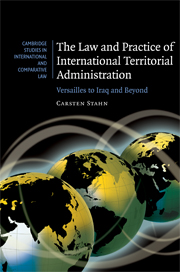Book contents
- Frontmatter
- Contents
- Foreword
- Preface
- Selected table of cases
- List of abbreviations
- Table of engagements
- Introduction
- Part I The historical and social context of international territorial administration
- Part II The practice of international territorial administration: a retrospective
- Part III The foundations of international territorial administration
- Part IV A typology of legal problems arising within the context of international territorial administration
- Introduction
- 13 The legal status of the administered territory
- 14 The status of international administering authorities
- 15 The exercise of regulatory authority within the framework of international administrations
- 16 The relationship with domestic actors
- Part V International territorial administration at the verge of the twenty-first century: achievements, challenges and lessons learned
- Bibliography
- Index
- CAMBRIDGE STUDIES IN INTERNATIONAL AND COMPARATIVE LAW
16 - The relationship with domestic actors
Published online by Cambridge University Press: 19 January 2010
- Frontmatter
- Contents
- Foreword
- Preface
- Selected table of cases
- List of abbreviations
- Table of engagements
- Introduction
- Part I The historical and social context of international territorial administration
- Part II The practice of international territorial administration: a retrospective
- Part III The foundations of international territorial administration
- Part IV A typology of legal problems arising within the context of international territorial administration
- Introduction
- 13 The legal status of the administered territory
- 14 The status of international administering authorities
- 15 The exercise of regulatory authority within the framework of international administrations
- 16 The relationship with domestic actors
- Part V International territorial administration at the verge of the twenty-first century: achievements, challenges and lessons learned
- Bibliography
- Index
- CAMBRIDGE STUDIES IN INTERNATIONAL AND COMPARATIVE LAW
Summary
International territorial administration entails conflicting duties. International actors are usually entrusted with transitional authority on the basis of the assumption that they are able to fill gaps or perform functions that domestic authorities are unable or unwilling to exercise. In that capacity, they may be forced to resist to political pressure from domestic leaders or to adopt measures which run counter to the prevailing public opinion in the territory under administration. At the same time, they are bound to exercise their powers for the benefit of the inhabitants of the administered territory and to “do themselves out of a job”.
The tension between institutional independence and the duty to transfer authority and/or to complete the administering mandate increases with the temporal progression of the mission. In fact, part of the success of comprehensive governance missions depends on how transitional administrations manage to handle this responsibility. If they hold on to power for too long, the operation may fail because international authority is subject to growing resentment by domestic actors. If international actors terminate their engagement too early or without a sustainable exit strategy, the progress achieved throughout the mission may be reversed by the return to previous power structures.
The way in which these responsibilities were handled has not always succeeded in practice. The concepts of self-determination and self-government have become more constant features of mandates of international administration. However, numerous problems have arisen in the interaction between international and domestic authorities and in the management of withdrawal/closure strategies.
- Type
- Chapter
- Information
- The Law and Practice of International Territorial AdministrationVersailles to Iraq and Beyond, pp. 717 - 730Publisher: Cambridge University PressPrint publication year: 2008

